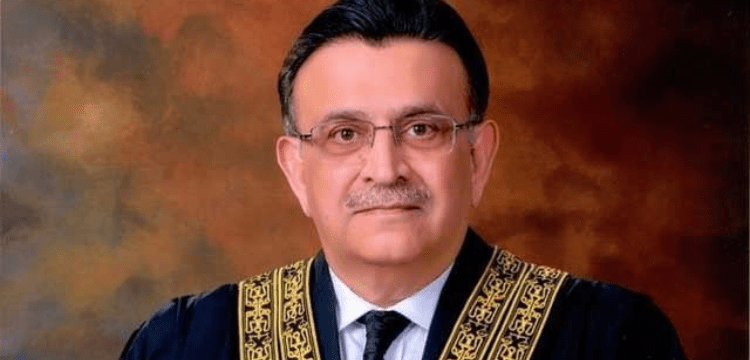[vc_row][vc_column][vc_column_text dp_text_size=”size-4″]ISLAMABAD: On Tuesday, Pakistan’s Chief Justice (CJP) Umar Ata Bandial stated that the Election Commission of Pakistan (ECP) had no authority to postpone the Punjab Assembly elections.
The Supreme Court (SC) has resumed hearing the petition filed by the Pakistan Tehreek-e-Insaf (PTI) against the Election Commission of Pakistan’s (ECP) decision to postpone Punjab elections until October 8.
The hearing is being presided over by a five-member larger bench led by CJP Bandial and comprised of Justices Ijazul Ahsan, Munib Akhtar, Aminuddin Khan, and Jamal Khan Mandokhail.
As the proceedings began, Attorney General of Pakistan (AGP) Usman Awan questioned the petition’s viability, arguing that matters concerning the elections should be referred to the Lahore High Court (LHC) after two apex court judges issued a detailed opinion in which they held that the earlier suo motu in the matter was dismissed by 4 – 3.
He claimed that the LHC had not delegated authority to the president to announce the election date.
The AGP also asked the court to convene a full bench to hear the case.
CJP Bandial, on the other hand, stated that the current case is a completely different matter in which the apex court is examining whether the ECP had the authority to postpone the election date.
He stated that the “question before the court is a simple one, whether or not the ECP can postpone the election date.” “If it has the authority to do so,” he said, “the proceedings will end right there.”
The newly appointed AGP argued in court that two SC judges had already declared a decision on the matter.
However, CJP Bandial ruled that the two judges’ opinions were irrelevant in this case.
“If the verdict was three to four, then the ‘breached’ orders do not exist,” AGP Awan responded.
“In fact, if there were no court orders, the president had no authority to even announce an election date,” he added, urging the court to first resolve the issue of the March 1 orders.
CJP Bandial observed that the AGP’s arguments were based on a “technical point,” despite the fact that the bench was considering the question raised in the application.
He also urged the AGP not to “complicate” the matter by asking questions that would cause the proceedings to be delayed.
The CJP directed Awan to make these arguments in a separate application, stating that the issue before the court was not “the fixing, but rather the postponement of the election date.”
Justice Mandokhail stated that the court would look into the ECP’s authority to extend the election date.
Justice Aminuddin Khan questioned whether the election schedule could be “reduced to less than 90 days,” while Justice Ijazul Ahsan stated that the ECP “has the right to adjust the election schedule within 90 days,” but could not go beyond that limit.
“The 90-day limit has been exceeded even now,” noted Justice Mandokhail, adding that elections “must take place under any circumstances, but the question now is who will extend the election date beyond the 90-day limit.”
“The other question is whether an assembly should be dissolved solely on the whims of one person,” Justice Mandokhail observed.
According to PTI lawyer Ali Zafar, “prime ministers and chief ministers are elected representatives of the people.”
“The assembly can be dissolved if the premier’s own party wishes to initiate a vote of no confidence against them,” Justice Mandokhail said.
Read More: Pakistan will not attend US Democracy Summit.
“If a motion for a vote of no confidence is moved, the assembly cannot be dissolved,” Ali Zafar replied, to which Justice Mandokhail replied, “should the parliament not take this issue up?”
“The powers of the prime minister and chief minister can be debated in parliament,” Zafar said.
The first principle of the constitution is Islam, and the second is democracy,” emphasised the PTI lawyer, “and democracy exists only through elections.”
“The ECP has the powers granted by Section 58 to ensure elections,” he added.
“What if the ECP reverses its decision and says nobody is supporting the electoral body in holding elections?” Justice Mandokhail wondered.
“To resolve the difficulties it faces, the commission will have to turn to the court,” the judge observed.
PDM to become party in case
Meanwhile, Senator and former law minister Farooq Naek of the Pakistan Peoples Party (PPP) requested that political parties be made parties to the case, arguing that they were also “stakeholders” in the issue at hand.
Previously, coalition government parties decided to become parties to the case, with the PPP, PML-N, and JUI-F expected to file applications.
According to Federal Law Minister Azam Nazeer Tarar, the ECP is independent of all orders.
“We said it on the first day, the verdict is 3-4,” the minister said as he entered the SC grounds, adding that “the ECP was simply doing its job as per Article 218(3).”[/vc_column_text][/vc_column][/vc_row]











